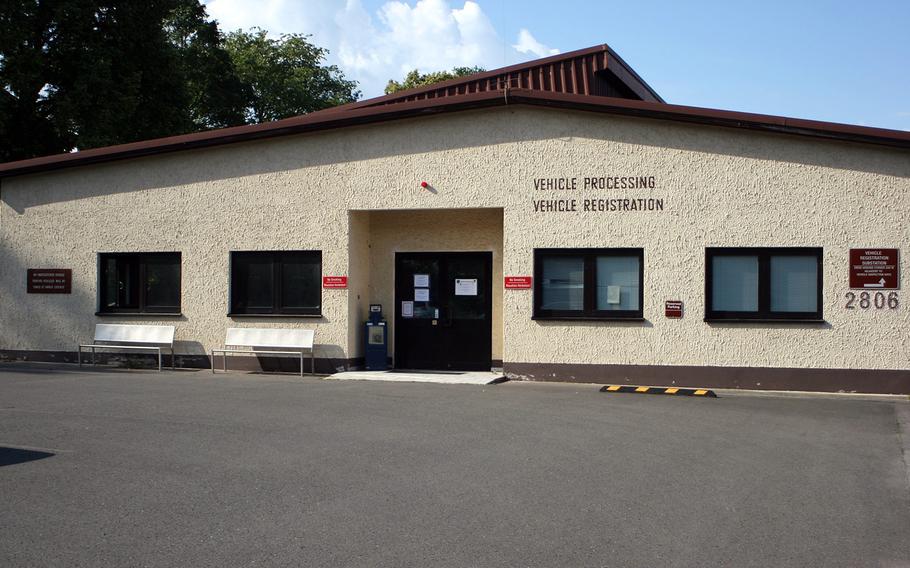
Kapaun Vehicle Registration in Kaiserslautern, Germany. Residents of the Kaiserslautern Military Community are being forced to compete for vehicle registration appointments, which are in extremely short supply in the U.S. military’s largest overseas community. (Facebook)
WIESBADEN, Germany — Access to many registration services for personal vehicles in the largest overseas U.S. military community has grown so scarce that the process for booking time slots is evoking references to “The Hunger Games.”
The Kaiserslautern Military Community used to have two places for Defense Department personnel that served as the equivalent of a stateside department of motor vehicles for its tens of thousands of members: the U.S. Army base in Sembach, and Kapaun Air Station in Kaiserslautern.
But in May, the Sembach vehicle registration office, which serves as the central hub for U.S. Army Europe vehicle registrations, discontinued customer service for privately owned vehicles. That shifted the burden solely to Kapaun, setting up the current situation, which has created a black market for service visits.
“When people have appointments scheduled that they no longer need, they are selling them,” said Amanda Hays, a KMC resident who works in Darmstadt. “People are desperate.”
Customers who don’t manage to land one of the 22 daily appointments must use an online queue system originally set up during the COVID-19 pandemic. The queue is accessed through either a link on Kapaun’s website or a QR code outside the station.
The queue is the virtual waitlist for walk-ins, which are handled separately from the scheduled appointments. The more people show up for appointments, the less availability there is on a given day for people in the queue.
For now, appointments are scheduled in 20-minute intervals from 7 a.m. to 2:20 p.m. But starting Aug. 5, some days will have 30-minute appointment blocks, reducing the number of available daily appointments to 15.
Hays’ family paid 100 euros for an appointment and had to sacrifice vacation time after weeks of unsuccessful attempts at getting into the queue, she said, adding that she was making loan payments on a car she couldn’t drive or pick up from the dealership.
A handful of social media users have offered to pay for slots or appointments, while others have alluded to potentially finding a new “side hustle.”
With the onset of the military moving season, the daily allotment for appointment slots has been filled for months on end. As of Monday morning, the soonest available appointment offered was Oct. 17.
On a walk-in basis, Kapaun’s substation adjacent to the vehicle inspection facility handles registration renewals, conversions of registration from temporary to permanent and cancellation of U.S. Army Europe registration for people who want to sell a vehicle to a non-ID card holder or ship it out of Germany.
Those walk-in services do not require use of the queue. For all other tasks, appointments are required.
“You can’t get into the queue. It’s almost impossible,” said Army officer Matthew Jones, who has been stationed in the KMC since 2017. “I couldn’t imagine the headache and the worry that (junior soldiers) would have being able to take care of their families in this position.”
According to the Kapaun vehicle registration office website, customers have five minutes to report to a clerk after notification their queue number is called. After 15 minutes, those customers are removed from the current day’s queue.
Although vehicle registration has always been problematic in the KMC because of its size, Jones said, this is the worst he has seen it.
For weeks, daily complaints across multiple community Facebook groups have told stories of the queue filling up within minutes of opening around 6:45 each morning.
Some people said they enlisted the help of neighbors and family members in different time zones to secure a place in line. Many have compared the daily struggle to playing the lottery or engaging in gladiatorial combat.
But even with a confirmed slot, customers had no guarantee they would be seen, as appointments still take priority. Queue slots are secondary to scheduled appointments and are subject to availability.
The vehicle registration office at Kapaun is run by the 569th Forces Police Squadron, which falls under the 86th Airlift Wing at Ramstein Air Base.
Neither Kapaun officials nor the wing answered questions from Stars and Stripes, saying only that leadership is studying the backlog.
Some changes have been implemented, though. In June, Kapaun started an initiative called Fridays for First-timers and Finals, which prioritizes newly arrived personnel who were registering a vehicle for the first time.
Since then, queue slots and customer service at the main station have been limited to that population on Fridays. Customers who are canceling registration can still walk in on Fridays.
On Thursday and Friday of last week, the office rolled over active queue slots to the following days. Previously, all slots were reset at the end of each day.
The 86th Airlift Wing is also seeking to open a substation on a KMC Army installation to help lighten the load at Kapaun, according to an email from the 86th Air Wing that was shared with Stars and Stripes. Kapaun also hired three new clerks to help process more customers.
But those temporary adjustments are far from adequate, Jones said.
“It’s like pouring antiseptic on a bullet wound. It’s still good, but it’s not sufficient to stop the bleeding,” Jones said. “Adding two or three more people isn’t going to create a situation where you can handle the demand of the Kaiserslautern Military Community.”
The Status of Forces Agreement requires DOD-affiliated personnel to register their personal vehicles in the USAREUR system to avoid German taxes and registration fees and use the Army and Air Force Exchange Service’s fuel program, which lowers the price drivers pay at on-base gas stations and participating Esso stations.